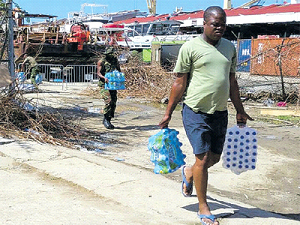(Trinidad Guardian) Dominica’s Prime Minister Dr Roosevelt Skerritt has revised the curfew hours in Dominica saying the security agencies had advised that “by and large most people are behaving themselves.”
However, he told the country on Thursday that the state of emergency will remain in effect at this time. The curfew imposed after Category 5 hurricane struck the island in mid-September was from 4 pm t0 8 am. The new curfew runs from 6 pm to 6 am. The curfew was imposed to prevent looting in the aftermath of the disaster. Skerritt admitted that there have been logistical problems in getting much-needed help to citizens, but he urged Dominicans to stop taking to social media to complain.

He said, “to get to over 70,000 people with our terrain is a challenge, We are delivering supplies and services to people at their homes.” He said access roads are “mashed up” and there are no buildings in communities to store supplies to make the distribution process easier.
Skerritt said “we have had to be on road packaging items and delivering, it is not a simple operation where you can rub a genie and everything is fixed. This is a practical operation that has all sorts of inherent challenges.” He urged Dominicans to get on board and assist and stop the complaining. “If a drain is blocked with galvanise take it out or else the water will settle and mosquitoes will breed and who will get bitten?”
The government, he said, is in a difficult financial position “we have not earned one cent since Hurricane Maria,” but despite the difficult economic circumstances, he said, it fell to him as the chief “fundraiser” to get the resources to help those who are in no position to help themselves. Thousands of people whose homes had been destroyed did not have insurance, several communities had to be relocated, and “this means we have to build houses, schools, health centres and other public amenities,” he said. Skerritt said it was more than likely he would give details today on “some solutions for housing that we are discussing.
We have been engaging companies, countries, institutions to find housing solutions that can withstand beyond category 5, that meets all of the construction codes and which also address the seismic issues in our region so that if something happens in the future we will be in a better position to withstand it.”
Aid for Dominica, he said, was coming in from a number of Caribbean and international agencies whom he said the country continues to be grateful for.
Meantime, the Ministry of National Security says this country continues to provide air and maritime support for Dominica.
The TT Coast Guard vessel, the TTS Brighton, left the country on Monday with approximately 23.2 tonnes of disaster relief items donated by citizens and corporate T &T bringing to total tonnage of relief items sent to Dominica to 36.7 tonnes.
Among the items which the Ministry said Dominica still needs are: chainsaws, generators, roofing material, tarpaulins, water, pre-packaged food, medical supplies, medicine for lifestyle diseases, baby cereal, disposable diapers, single ring burner stoves and pumps for distributing bulk water.
